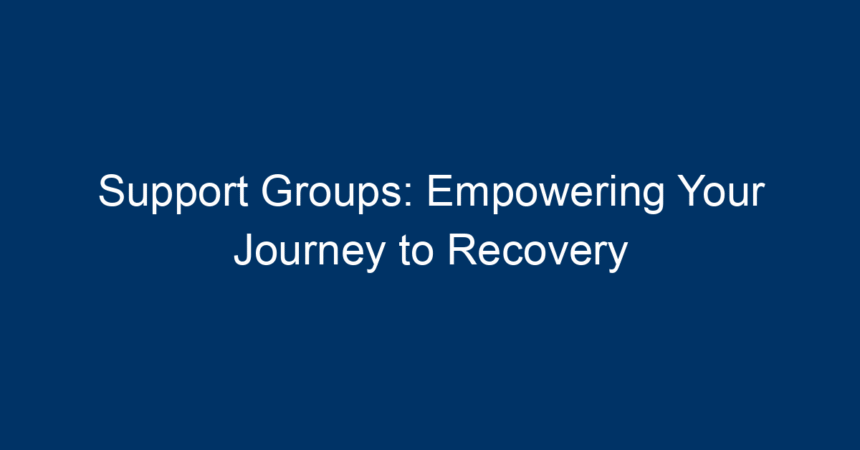In today’s fast-paced world, facing personal challenges can often feel isolating. From addiction recovery to mental health struggles, navigating these journeys alone can be daunting. This is where support groups come into play. Support groups are vital spaces where individuals can connect, share experiences, and seek guidance. In this article, we’ll explore the importance of support groups, how they empower individuals, and actionable insights for finding and participating in them.
What Are Support Groups?
Support groups are gatherings of individuals who share common experiences or challenges. They provide a safe and nurturing environment where participants can express their feelings, share coping strategies, and gain encouragement from others on similar paths. Support groups can focus on various issues, such as addiction, grief, chronic illness, and mental health disorders.
The Role of Support Groups in Recovery
Support groups play a crucial role in the recovery process:
-
Emotional Support: Being in a space where everyone understands your struggles fosters camaraderie. It helps individuals realize that they are not alone in their journey.
-
Shared Experiences: Participants can share their personal experiences, which can lead to new insights and coping strategies. Listening to others’ stories can provide hope and inspiration.
-
Accountability: Regular attendance at support groups encourages individuals to stay committed to their recovery goals. Members often motivate each other to stay on track.
- Access to Resources: Support groups can connect members with useful resources such as therapists, counselors, or additional recovery programs. This network often extends beyond the group itself.
Types of Support Groups
Support groups come in various forms, tailored to meet different needs. Here are some of the most common types:
1. Peer Support Groups
These are informal gatherings where individuals who share similar life experiences come together. Peer support groups can be crucial for anyone recovering from addiction or overcoming mental health issues.
2. Professional Support Groups
Led by trained facilitators or therapists, these groups offer structured guidance and a safe space for members to discuss their challenges. The insights from professionals can often provide valuable tools for coping.
3. Online Support Groups
With the rise of technology, many support groups now meet virtually. Online platforms allow individuals to connect from anywhere, making it easier to find support when geographical or mobility barriers exist.
4. Specialized Support Groups
These groups focus on specific issues, such as autism, depression, grief, or parenting. Specialized groups can provide tailored advice and strategies relevant to particular challenges.
Benefits of Joining Support Groups
Joining a support group can have profound benefits for individuals seeking recovery. Here’s an in-depth look at some of these advantages:
A Safe Space for Vulnerability
Discussing personal struggles can be intimidating, especially in traditional settings, such as therapy. Support groups provide a non-judgmental space where participants can open up without fear. This vulnerability fosters deeper connections and understanding.
Building Social Connections
Many individuals struggling with addiction or mental health issues often feel isolated. Support groups provide a sense of belonging, allowing members to form friendships with others who understand their situation. These connections can be crucial for long-term recovery.
Learning Coping Mechanisms
Members can share effective coping mechanisms and strategies that have worked for them. This collaborative learning can help individuals discover new techniques that resonate with their unique circumstances.
Reducing Stigma
Being part of a support group helps to combat the stigma surrounding mental health and addiction. By openly discussing these topics, members can contribute to breaking down barriers and fostering understanding in their communities.
How to Find the Right Support Group
Finding the right support group can significantly enhance your recovery journey. Here are actionable steps to help you choose wisely:
1. Assess Your Needs
Understanding your specific needs is the first step. Are you looking for emotional support, practical advice, or a combination of both? Knowing what you want will help guide your search.
2. Research Options
Use online resources, social media, or community centers to find local or online support groups. Websites like Meetup or National Alliance on Mental Illness (NAMI) can help you locate options that suit your needs.
3. Attend a Trial Meeting
Many support groups allow potential members to attend a meeting before making a commitment. This trial run can help you assess the group’s dynamics, effectiveness, and whether it feels like a good fit.
4. Consider Group Dynamics
Every group has its unique vibe. Pay attention to how members interact with each other. A warm, respectful atmosphere often leads to a more supportive experience.
5. Stay Open-Minded
It’s important to recognize that not every group will be the right fit initially. If a group doesn’t resonate with you, don’t hesitate to try another one. Your recovery journey is personal, and finding the right support is essential.
Actionable Insights for Maximizing Your Support Group Experience
Joining a support group is just the beginning. To truly benefit from the experience, consider these actionable insights:
Set Goals for Participation
Before attending your first meeting, set clear goals. What do you hope to achieve? Whether it’s sharing your story or learning new strategies, having goals can enhance your participation.
Be Present and Engaged
Active participation enriches the experience for both you and others. Listen attentively, share your thoughts, and offer support to fellow members.
Maintain Confidentiality
Respecting the confidentiality of what is discussed within the group is essential. This trust fosters a safe environment, allowing everyone to share openly.
Use Supplemental Resources
Many support groups provide handouts, resource lists, or recommended reading materials. Utilize these tools to deepen your understanding and reinforce your learning.
Encourage Others
Supporting fellow members can be a valuable part of your own healing. Offering encouragement and sharing your insights can boost your confidence and create a stronger community.
Conclusion: Empowering Your Journey
Support groups are powerful tools in navigating the complexities of recovery. By providing emotional support, shared experiences, and practical coping mechanisms, they empower individuals to reclaim their lives. If you’re considering joining a support group, remember to assess your needs, research options, and set clear goals for participation. Your journey towards healing and empowerment is unique, and support groups can play a vital role in that path.
As you embark on this journey, remember: you are not alone. Embrace the camaraderie, share your story, and let the wisdom of your peers guide you as you walk the road to recovery. Your journey is powerful, and support groups can help amplify that power, turning challenges into triumphs.




